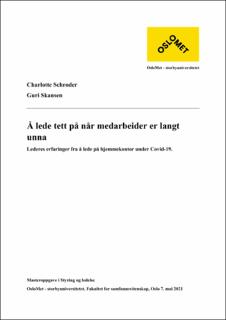| dc.description.abstract | The employees cries on the phone. They don't shed any tears on Teams. This is among the experiences we have found in interviews with managers in various agencies and districts in the City of Oslo. These nine managers have been leading their employees from home, for over a year, due to the pandemic. We wanted to hear the leaders' experiences, what have been the main differences in managing from home and leading in the office? What kind of adjustments have they made?
As a framework for the interviews, we used key elements from theory on management and motivation, as well as choosing topics from surveys, literature and articles about remote leadership. Central to the interviews is what the managers think is efficient management in the new situation. How they maintain relations, availability and motivation, the extent to which they maintain control and overview of tasks and what we find most interesting; to what extent do they believe that they are able to maintain trust between themselves and their employees?
We quickly observed that all our informants put a lot of effort into taking care of their employees. We found a high level of awareness of which leadership qualities were suitable for good management from home. Several of the managers commented that they believed to have become better leaders over the past year. They have higher confidence in their employees; involve, delegate and carry out more structured follow-up, but less control. The managers commented on a higher awareness of the employee's individual needs.
Our nine leaders commented on the importance of keeping up motivation, but found it difficult to take care of the psychosocial aspects of the workplace. They are concerned that it will have a negative impact on work and the social relations, if the shutdown last much longer. It is also generally that some tasks are more difficult to perform from home than through meeting physically. Managing development processes is challenging. The managers are also concerned about the care of new employees.
The managers all believe that increased use of home offices should become part of the new working day, but look forward to it being self-chosen, as they believe it has a major impact on long-term motivation. | en_US |
